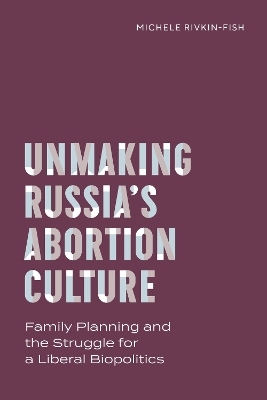
Unmaking Russia's Abortion Culture
Family Planning and the Struggle for a Liberal Biopolitics
Seiten
2024
Vanderbilt University Press (Verlag)
978-0-8265-0697-9 (ISBN)
Vanderbilt University Press (Verlag)
978-0-8265-0697-9 (ISBN)
Examines the creative strategies of Russians who promoted family planning in place of routine abortion. Rather than emphasizing individual rights, they explained family planning’s benefits to the nation - its potential to strengthen families and prevent the secondary sterility that resulted when women underwent repeat, poor quality abortions.
As the predominant form of birth control in Soviet society, abortion reflected key paradoxes of state socialism: women held formal equality but lacked basic needs such as contraceptives. With market reforms, Russians enjoyed new access to Western contraceptives and new pressures to postpone childbearing until economically self-sufficient. But habits of family planning did not emerge automatically—they required extensive physician retraining, public education, and cultural transformation. In Unmaking Russia’s Abortion Culture,Rivkin-Fish examines the creative strategies of Russians who promoted family planning in place of routine abortion. Rather than emphasizing individual rights, they explained family planning’s benefits to the nation—its potential to strengthen families and prevent the secondary sterility that resulted when women underwent repeat, poor quality abortions. Still, fierce debates about abortion and contraceptives erupted as declining fertility was framed as threatening Russia’s demographic sovereignty.
Although Russian family planners embraced a culturally meaningful liberalism that would rationalize public policy and re-enchant relations, nationalist opponents cast family planning as suspicious for its association with the individualistic, "child-free" West. This book tells the story of how Russian family planners developed culturally salient frameworks to promote the acceptability of contraceptives and help end routine abortion. It also documents how nationalist campaigns for higher fertility worked to de-fund family planning and ultimately dismantle its institutions. By tracing these processes, Unmaking Russia’s Abortion Culture demonstrates the central importance of reproductive politics in the struggle for liberalizing social change that preceded Russia’s 2022 descent into war, repression, and global marginalization.
As the predominant form of birth control in Soviet society, abortion reflected key paradoxes of state socialism: women held formal equality but lacked basic needs such as contraceptives. With market reforms, Russians enjoyed new access to Western contraceptives and new pressures to postpone childbearing until economically self-sufficient. But habits of family planning did not emerge automatically—they required extensive physician retraining, public education, and cultural transformation. In Unmaking Russia’s Abortion Culture,Rivkin-Fish examines the creative strategies of Russians who promoted family planning in place of routine abortion. Rather than emphasizing individual rights, they explained family planning’s benefits to the nation—its potential to strengthen families and prevent the secondary sterility that resulted when women underwent repeat, poor quality abortions. Still, fierce debates about abortion and contraceptives erupted as declining fertility was framed as threatening Russia’s demographic sovereignty.
Although Russian family planners embraced a culturally meaningful liberalism that would rationalize public policy and re-enchant relations, nationalist opponents cast family planning as suspicious for its association with the individualistic, "child-free" West. This book tells the story of how Russian family planners developed culturally salient frameworks to promote the acceptability of contraceptives and help end routine abortion. It also documents how nationalist campaigns for higher fertility worked to de-fund family planning and ultimately dismantle its institutions. By tracing these processes, Unmaking Russia’s Abortion Culture demonstrates the central importance of reproductive politics in the struggle for liberalizing social change that preceded Russia’s 2022 descent into war, repression, and global marginalization.
Michele Rivkin-Fish is an associate professor of anthropology at the University of North Carolina, Chapel Hill.
A Note on Transliterations
List of Figures
Preface
Introduction: Through the Looking Glass
Chapter 1: Birthing a Voice through Narratives of Abortion
Chapter 2: Fighting for Contraceptives with Soviet Biopolitics
Chapter 3: Conceptualizing Liberal Reproductive Governance
Chapter 4: Adopting Global Family Planning with Neoliberalism
Chapter 5: Recreating Professionals through Contraceptive Counseling
Chapter 6: Feminist Activism Reborn
Conclusion: Liberal Aspirations and Neoliberal Realities
Appendix 1. Timeline of Key Events Discussed in the Study
Appendix 2. Tables
Notes
Bibliography
Index
| Erscheinungsdatum | 03.09.2024 |
|---|---|
| Reihe/Serie | Policy to Practice |
| Zusatzinfo | 13 b&w images |
| Verlagsort | Tennessee |
| Sprache | englisch |
| Maße | 152 x 229 mm |
| Themenwelt | Sozialwissenschaften ► Ethnologie |
| Sozialwissenschaften ► Politik / Verwaltung ► Politische Theorie | |
| Sozialwissenschaften ► Soziologie | |
| ISBN-10 | 0-8265-0697-6 / 0826506976 |
| ISBN-13 | 978-0-8265-0697-9 / 9780826506979 |
| Zustand | Neuware |
| Haben Sie eine Frage zum Produkt? |
Mehr entdecken
aus dem Bereich
aus dem Bereich
Der »progressive« Angriff auf Israel, Judentum und …
Buch | Softcover (2024)
edition TIAMAT (Verlag)
28,00 €
ein Vortrag
Buch | Softcover (2024)
Suhrkamp (Verlag)
10,00 €


